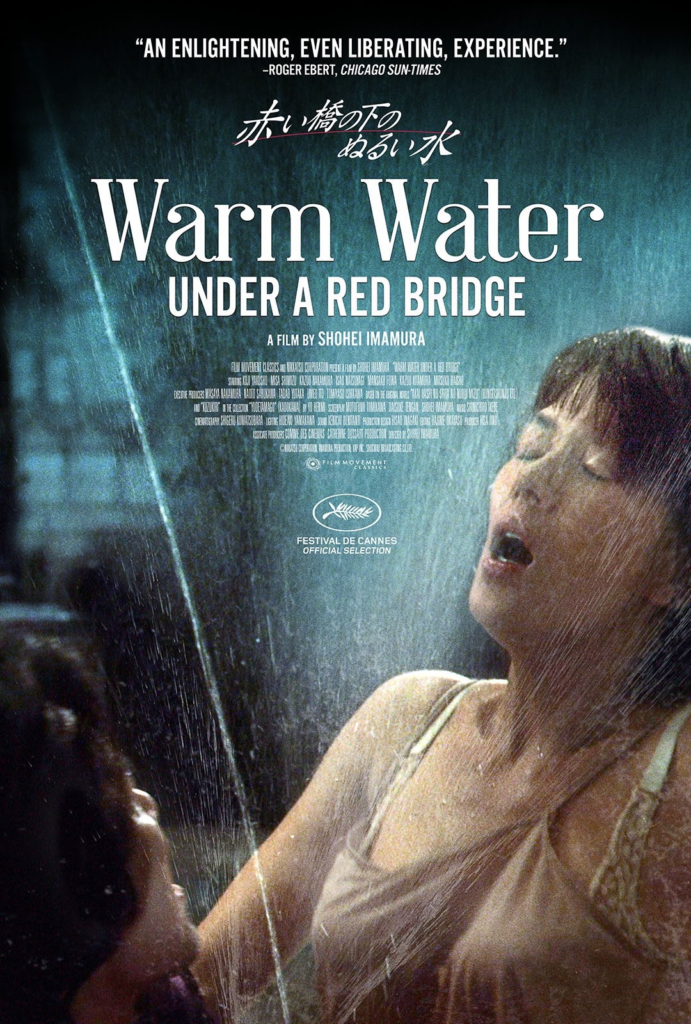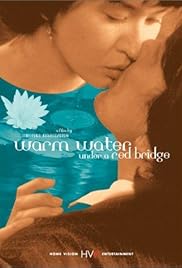
WARM WATER UNDER A RED BRIDGE (Akai hashi no shita no nurui mizu)
(director/writer: Shohei Imamura; screenwriter: from a novel by Yo Henmi/Daisuke Tengan/Motofumi Tomikawa; cinematographer: Shigeru Komatsubara; editor: Hajime Okayasu; music: Shinichirô Ikebe; cast: Koji Yakusho (Yosuke Sasano), Misa Shimizu (Saeko Aizawa), Mitsuko Baisho (Mitsu Aizawa), Mansaku Fuwa (Gen), Isao Natsuyagi (Masayuki Uomi), Yukiya Kitamura (Shintaro Uomi), Kazuo Kitamura (Taro), Hijiri Kojima (Miki); Runtime: 119; MPAA Rating: NR; producer: Hisa Iino; Cowboy Pictures; 2001-Japan-in Japanese)
“Imamura’s ability to tell a story is something to behold, even in this impossible one.”
Reviewed by Dennis Schwartz
The venerable 75-year-old Japanese filmmaker Shohei Imamura (“The Profound Desire of the Gods”/”The Pornographers”) presents a ribald, absurd, darkly comical fantasy “Warm Water Under a Red Bridge.” It starts off telling about a caring relationship that developed between a middle-aged married college-educated Tokyo office worker Yosuke Sasano (Koji Yakusho) and an elderly intellectual street person, an ex-con named Taro (Kazuo Kitamura), with no visible means of support. Taro lived mysteriously in a hut by the riverbank and was surrounded by an eclectic mix of scholarly books filling his bookshelves. He was known as the ‘blue tent philosopher’ and counseled Yosuke to enjoy life to the fullest while he’s still young and able to maintain an erection, and most of all to always think for himself. Yosuke has been despondent ever since his company went bankrupt and he was left unemployed. As a result he had to sell his house and his nagging wife moved to another location with their young son, as she calls him a loser. In their phone conversations, she is only interested in him sending his unemployment check as their marriage has soured beyond repair since he is no longer the provider.
Taro before he died ranted frequently about a treasure worth over a million yen he left behind after WW11 in an old house by a red bridge where the village river runs into the sea and is bordered by the Tateyama Range, in a small fishing village in the Noto Peninsula. The treasure is a golden Buddha he stole from the Kyoto temple and hid in a flowerpot. Yosuke decides to go there and see for himself if it’s true. While there he gets involved with an attractive young woman, Saeko Aizawa (Misa Shimizu), who lives in the old house with her senile fortune telling grandmother, Mitsu Aizawa (Mitsuko Baisho). Granny had a lover who abandoned her some time ago, and she still yearns for his return. Saeko’s mother drowned in the sea and she’s still haunted by that memory.
Saeko has a strange physical condition no doctor believes, whereby she stores water inside that fills up to her throat and she gets sexually aroused to such a degree that she either has to have sex or go shoplifting. Also, upon intercourse she releases what amounts to a geyser. Yosuke watches her leave the house and then follows her to the supermarket and then to her house as he returns an earring she dropped in a puddle. On this first encounter her water has built up inside her and the water release is gushing all over the floor during sex. This kinky sex excites him but shames her. Afterwards they feast on the cheese she stole at the supermarket.
The routine life of the dull salaried office worker suddenly changes to an unpredictable one where Yosuke seems to be living in a fantasy world, as Saeko becomes his girlfriend and Yosuke forgets to search for the treasure. Yosuke lands a temporary job as a fisherman on a boat, which he gets after he sticks up for an African runner attending a local college while training for the Olympics. The boss’s son (Yukiya Kitamura) says that he must be a serious worker because he cares about others, as he witnesses him coming to the foreigner’s defense and hires him immediately. A running gag, which is unfortunately repeated once too often, has Yosuke running past the African who is on his training run, as he rushes to satisfy the urgent sex call from his girlfriend who awaits him at home after signalling him at sea by using the sun reflections on a mirror.
Saeko emerges as a goddess of nature, while Yosuke emerges as an urban corporate type who is a compassionate person but who has been beaten down all his life and now seizes the moment to survive his crisis by reinventing himself and living for his desires. The filmmaker seems to suggest that this uncertainty about employment and love in his life is worth the risk. The familiar themes from Imamura’s other films emerge; such as, the threat in modern society against the loss of individuality, the foolishness of selling one’s soul for lifetime security in the business world, how one’s life is wasted by getting trapped into doing only what society expects, and the inevitable forthcoming changes in the world that one better adjust to. The filmmaker expects science and technology to play a major role in the new century.
“Warm Water Under a Red Bridge” is based on a book by Yo Henmi. Imamura skillfully milks its absurdities into a provocative and lyrical and surreal comedy that is highly entertaining and with enough intelligent fodder to keep one thinking about all the many themes he presents. The film grows more complex in the subplots introduced. The photography is grand and Imamura’s ability to tell a story is something to behold, even in this impossible one.

REVIEWED ON 1/23/2003 GRADE: B + https://dennisschwartzreviews.com/